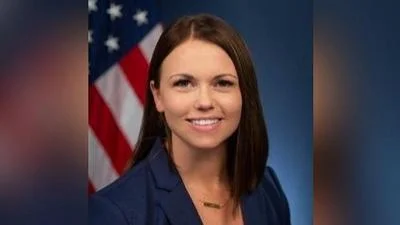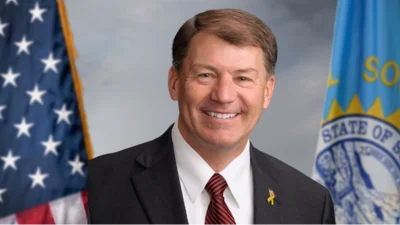The Congressional Record is a unique source of public documentation. It started in 1873, documenting nearly all the major and minor policies being discussed and debated.
“IMPEACHMENT” mentioning John Thune was published in the Senate section on pages S159-S160 on Jan. 27.
Of the 100 senators in 117th Congress, 24 percent were women, and 76 percent were men, according to the Biographical Directory of the United States Congress.
Senators' salaries are historically higher than the median US income.
The publication is reproduced in full below:
IMPEACHMENT
Mr. DURBIN. Mr. President, today, January 27, marks an anniversary, in a way, of an event that occurred in this Chamber 3 weeks ago, an event on January 6, which some of us will never forget.
We are in the midst of preparing for an impeachment trial of President Donald Trump for any responsibility that he bears for that day's events. Some have said we shouldn't do that, that we shouldn't have an impeachment trial.
The former U.N. Ambassador and Governor of South Carolina, Nikki Haley, said in an interview on FOX television it is time for America to get over it--get over it. She is not the only one who has expressed that point of view.
I was in the airport in Chicago last week in a waiting area to get on a plane when someone seated nearby said: Hey, Senator, get over it. Let this President ride off into the sunset. Those were his words: Get over it.
It is hard to get over it if you lived it, and many of us in this Chamber did.
Last night, there was a vote as to whether we should go forward with the impeachment. All of the Democrats, 50, voted in favor of having the trial, since we received that Article from the House. Five--five--
Republicans joined us. Forty-five Republicans voted to end the impeachment proceeding, voting in favor of the point of order that was raised by the junior Senator from Kentucky.
I don't know what was going through their minds when they joined that point of order from the Senator from Kentucky. I don't know if it truly was a constitutional issue they were thinking about, whether it was loyalty to Donald Trump, or whether it was fear of Trump's followers in their home States that led them to vote to end the impeachment inquiry.
But we should move forward. We should go forward, as Lincoln reminded us, because we cannot escape history, and we certainly shouldn't be party to rewriting history.
When almost 50 percent of Trump loyalists refuse to believe that the events 3 weeks ago in this Capitol occurred or, if they occurred, that they had anything to do with President Trump, we need to make a record, a record of fact, not just for our current deliberations but for history.
How can anyone who was in this Chamber on January 6 really argue that nothing critical and important and horrific occurred?
Do you remember at 2:15, when the Secret Service went up and grabbed the Vice President by his arms and pulled him down, out that door, so they could take him to a secure place? We were stunned by that. I was.
They told us to sit here. And do you know what I saw next? Two men, plainclothes security people--I don't know what Agency they were working for--came right down here, right down in the middle of this well. Why do I remember that they were there? Because one of them had an automatic weapon around his neck, in the Senate Chamber.
Then we were told by a Capitol policeman who stood in front of us: Sit down. Stay in your seats. We are bringing in your staff and locking the doors. This will be a secure room. Then they closed the doors off to the public, and we sat here for a few minutes.
And then the same policeman said: Leave. Evacuate quickly, out the doors. The crowd, the mob, was advancing and getting closer to the Senate Chamber.
We went out the back corridor and down the steps. As you go down the steps, there is a window that looks out on the sidewalk near the Capitol Building, and I saw this mob coming at us with Trump flags and American flags and signs--coming right at us. We hurried down those steps and through the long tunnel to, we hoped, a safe location in one of the office buildings nearby.
I will never forget it. Do the 45 Senators who voted against the impeachment trial last night still remember it? I certainly hope they do, and I certainly hope they can recall it as they watch the videotapes, the mountain of videotapes of what happened that day.
And, of course, I hope we all remember what the Capitol Police went through. For those who say they love law and order, take a look at what they went through when this mob came after them. They were beaten. One gave his life. And we can never forget.
So how did this come about? Was this just a spontaneous gathering of people who decided to come to Capitol Hill? Far from it. The President of the United States, Donald Trump, requested his followers to come to Washington on January 6. Why did he pick January 6? Because the Constitution says that is the day when Congress will count the electoral votes and determine who will be the next President.
And because President Trump refused to accept the reality of his loss on November 3 and continued in every imaginable way to try to change the numbers coming out of States like Georgia, he called his followers to Washington on that day and held a rally on the Ellipse
We have a tape of that rally, and it should be part of the record as to what this President said to his followers who had gathered on that day, how his rhetoric inflamed them. We can see it. It is a matter of record.
Then he pointed to the Capitol Building, this building, and told them to come up here. Why? Because we were in the process of counting the electoral votes, which would finally and constitutionally announce that he had lost the election. It was his last desperate gasp to keep the White House, even at the expense of the Constitution and reality.
Then the crowd turned and advanced on the Capitol. We have seen those videotapes as well, as they overran the flimsy barricades that were set up in the hopes that they would discourage and stop them. And they broke through windows and doors, came into this building, invading it for the first time since 1814.
It was 1814 when the British forces came into this building, burned it, as an invasion. Well, this was a new invasion, an invasion by those who were either inspired by this President or, for whatever political reasons, decided to try to stop this government.
It is the first time that has ever happened since 1814. I will never forget it. I am sorry to say that the 45 Senators who said stop the investigation, stop the impeachment, may not have as clear a memory as I do.
Each year, we have a commemoration of George Washington's Farewell Address, and a different Member of the Senate is asked to read it on the floor of the Senate. I have to tell you that, honestly, I don't come to the floor and listen carefully. It doesn't have the impact it once had. It is a commemoration which is honorific but doesn't have the real power to create a memory.
Doug Jones is a former Senator from Alabama, and he said on Martin Luther King's birthday, or nearby, we should all come to the floor and hear a reading of King's letter from the Birmingham jail, and I think that is appropriate and it is good.
How will we remember and commemorate January 6? Maybe it is too soon to think about that, but how can we forget what happened that day? How can we possibly get over it?
I don't want to get over it. I want to face it squarely and honestly with the facts. History demands it of us. Those of us who are honored to serve in this Chamber bear a responsibility to keep the facts alive, not let those who wish to ignore them or rewrite history have the last word.
We now have a responsibility to go forward with this impeachment trial, to make a record and decide as a U.S. Senate. We owe it to the people we represent. That is for sure. But, more importantly, we owe it to future generations to show them just how fragile a democracy can be when a mob turns on the U.S. Capitol and tries to stop the business of this government.
The good news is this. If there is any source of elation, it is this: We returned to the Capitol that same day, January 6, and finished our business of counting the electoral vote. In the early hours of the morning of January 7, Joseph Biden was announced the winner of the Presidency, and just 2 weeks later--2 weeks later to the day--he was sworn in as President of the United States.
Our democracy survived this mob that came forward in insurrection against our government, and we are now in the beginning of the second week of the Biden Presidency. He has spoken to the American people and told them we are going to come together; we are going to unify. Bless him for doing that.
We owe him this opportunity. We owe it to our country.
I yield the floor.
I suggest the absence of a quorum.
The PRESIDING OFFICER. The clerk will call the roll.
The legislative clerk proceeded to call the roll.
Mr. THUNE. Mr. President, I ask unanimous consent that the order for the quorum call be rescinded.
The PRESIDING OFFICER. Without objection, it is so ordered.
____________________



 Alerts Sign-up
Alerts Sign-up